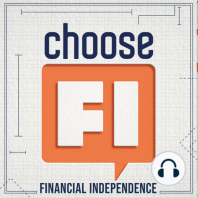24 min listen
303 | Structuring Your Emergency Fund | Stereo Live Q&A
FromChooseFI
ratings:
Length:
66 minutes
Released:
Mar 12, 2021
Format:
Podcast episode
Description
In the second episode in the series of taking the show live online via the Stereo app, listeners ask questions and interact during a replay of this live podcast from Tuesday evening. Experimenting with this new show format, Brad and Jonathan are adding to their talents stack and themselves getting better through the often mentioned concept of the aggregation of marginal gains. Unfortunately, just because you make progress in an area, it doesn’t always mean you hold on to those gains. While your finances can be put on autopilot, physical and mental health are areas prone to backsliding. Take a little time for self-care. While reaching financial independence isn’t as simple as packing your lunch every day, it can be symbolic of the transformation to a mindset to take care of all the small things. It’s that effort, in the aggregate, that gives you the space to increase your savings rate, optimize investments, and earn market gains. Brad has been trying to apply the concept to his health, which has also required that he overcome several limiting beliefs. All of the changes he’s been making are small, like stretching, doing pushups, or yoga in the evening while watching TV with his family. And after hearing about how important vitamin D is to metabolic health, he tested his levels and found out they were dangerously low. In his attempt to live a more examined life, Brad has noticed certain foods lead to inflammation, and that his energy level fluctuates with the seasons. Likewise, Jonathan has been examining his use of caffeine and trying to decide if he is better off with it or without it. He would prefer to have a natural, steady energy state. He’s noticed that by decreasing processed sugars, he has more energy and wakes up fresher. Brad has been using a 10-minute nidra yoga YouTube video as a guided sleep meditation and says it’s like getting a two-hour nap. Listener Jackie left a voicemail asking about taking a little risk by putting emergency funds into the bond market. Jonathan says there’s no one answer, but he thinks we need to look at what we’re protecting ourselves against and the opportunity cost that comes with having a lot of money on hand to handle emergencies. Most of us will benefit from having $1,000 in the bank to start, and then moving to one or two months of expenses in cash. As your net worth grows, Jonathan would prefer to have the money in a fully-funded emergency fund grow. Since recording episode 066 with Big ERN, Brad has been trying to come up with a true financial emergency scenario. He’s been unable to think of a scenario when he might need cash in a hurry that couldn’t be covered immediately with a credit card. In a true emergency, he has invested assets he could sell and transfer to his checking account to then pay the credit card bill. When you keep an emergency fund in a savings account, the opportunity costs are the potential gains that could have been made by having those funds invested. Jonathan keeps a couple of months of cash flow. In addition to retirement investments, he also has a taxable brokerage account with M1 Finance. His investment pies in M1 have been allocated for different timelines. For his shorter timeline fund, he thinks about it more like a retiree would and wants it stable. Therefore, he keeps it in a fund that is negatively correlated to the stock market, such as bonds and precious metals. For emergencies, one of the benefits of M1 Borrow is access to a low-interest margin loan against your invested non-retirement assets. The second listener voicemail asks about the ability to convert and access 401K investments after a five-year waiting period for someone who retires early. Brad believes the listener has a Roth 401K, in which contributions are made with after-tax dollars and may be withdrawn tax-free. The five-year waiting requirement applies to Roth IRA Conversion where traditional 401K contributions are converted to a Roth IRA and it is a taxable event. When rolling over mo
Released:
Mar 12, 2021
Format:
Podcast episode
Titles in the series (100)
006 | The Power of Partnerships | ChooseFI Origin Story: In Today’s Podcast we cover: The Power of Partnerships How Brad and Jonathan met Our decision to partner up on Choose FI The importance of taking action The value of personal relationships in an online world by ChooseFI
